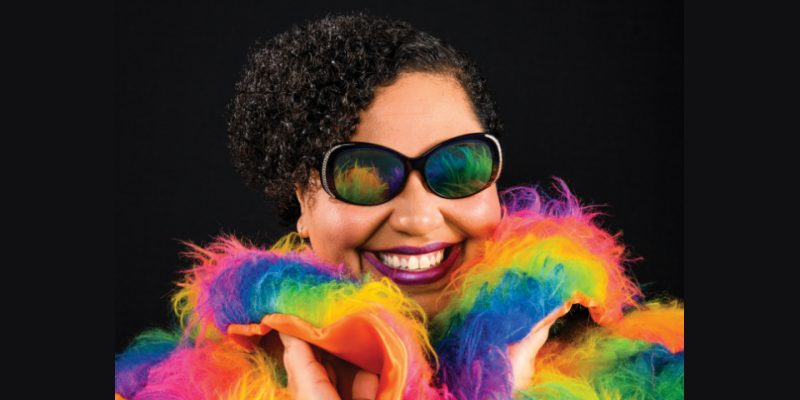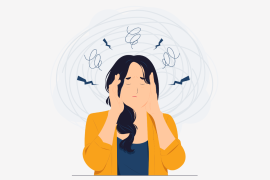By Shelby Rowe Moyer | Photo courtesy Jeff Miller/UW-Madison
A lot of judgment, guilt and assumptions are placed on pleasure — from food to sex to moments of relaxation.
In general, we live in a society that places undue shame on an expansive list of things that bring people joy, says Sami Schalk, a pleasure activist, author and associate professor at the University of Wisconsin-Madison.
The term “pleasure activism” is relatively new. Schalk first heard about it from the woman who coined it, adrienne maree brown, the author of the 2019 bestselling title, “Pleasure Activism: The Politics of Feeling Good.”
Schalk — whose research focuses on disability, race and gender in contemporary American literature and culture — likes discussing how pleasure activism intersects with people with disabilities. She notes that people with disabilities are often desexualized and there’s this assumption that living with a disability is inherently bad or painful.
“So, there’s been a lot of work for disabled folks to talk about the pleasure and the knowledge and the joy that can emerge from experiences of disability.”
And while pleasure activism is about much more than sex, sex and sexuality are also important components. Schalk actually has an essay within brown’s book where she shares openly about her ethical practice of polyamory (having intimate relationships with more than one partner with all partners’ consent) and BDSM (bondage, discipline, domination and submission) — something she’d never written about publicly. Initially, she figured brown’s book would have a niche audience, and then it became a New York Times Bestseller.
“It gave me accidental permission to just lean fully into it,” Schalk says. “… It was another kind of coming out. Like, whoa, this is a thing that I’ve been hiding and so scared of people finding out, because I’m worried people will think bad things about me, even though it brings me such joy. I don’t want to live like that anymore.”
Being established in her career made Schalk feel a little more confident about opening up about her intimacy practices. And it ties back to the politics of pleasure, and how it’s oppressive to socially police and place stigma upon actions that aren’t harming anyone, Schalk says.
“There’s no way you can tell me that, ‘Oh, you’re not going to be a good teacher or a good scholar because you’re queer or because you’re poly or because you’re kinky,’ because I’ve been doing all these things the whole time, and ya’ll just didn’t know.”
As another example, Schalk retells the story of the time she danced on stage with Lizzo during a concert in Madison, and a video of it went viral. A group of online commentators said Schalk shouldn’t be allowed to teach because this was inappropriate behavior for a professor.
“I was like, to go to a concert and dance? … Me going to a concert and enjoying myself has nothing to do with my ability to do my job and do it well,” she says.
Ultimately, pleasure activism is good for everyone. It gives everyone permission to enjoy what they like (as long as it’s not harmful to anyone).
But indulging yourself isn’t the end goal, Schalk says. There needs to be a widespread redistribution of pleasure. Check any instincts you have to suppress, denigrate or judge other people’s joy. If you have money, donate it to social justice organizations. And be mindful of how your presence influences the experiences of others, Schalk says.
“Being able to break that pattern around shame really allows people to be their fullest selves,” Schalk says.
WHAT IS PLEASURE ACTIVISM?
Schalk is very involved in activism, and she says infusing more joy into social justice work is one of the main tenets of adrienne maree brown’s explanation of pleasure activism.
So what could that look like? One example could be having dancing, music and counselors at protests to help heal and rejuvenate the people doing this work. Activism is physically, emotionally and mentally draining, so the work can’t be the fight alone. Without joy, people get burned out.
“If activism is about liberation and freedom, then you also have to work on accessing your own liberation and freedom by being able to feel pleasure and provide yourself pleasure in order for this work to be sustainable,” Schalk says.
Another main aspect of pleasure activism spotlights how marginalized people often experience an “uneven surveillance” of pleasure, such as the police being called on people of color doing everyday things, like laughing, dancing or listening to music, says Schalk. A simple Google search reveals countless incidents where moments of leisure turned into police run-ins — Black people barbecuing in a park, sitting in a Starbucks and playing golf. The ability for everyone to freely express pleasure and live their lives is part of social liberation, Schalk says, and it’s something that needs to be collectively valued.
Want to learn more? Check out brown’s book, “Pleasure Activism: The Politics of Feeling Good.”




